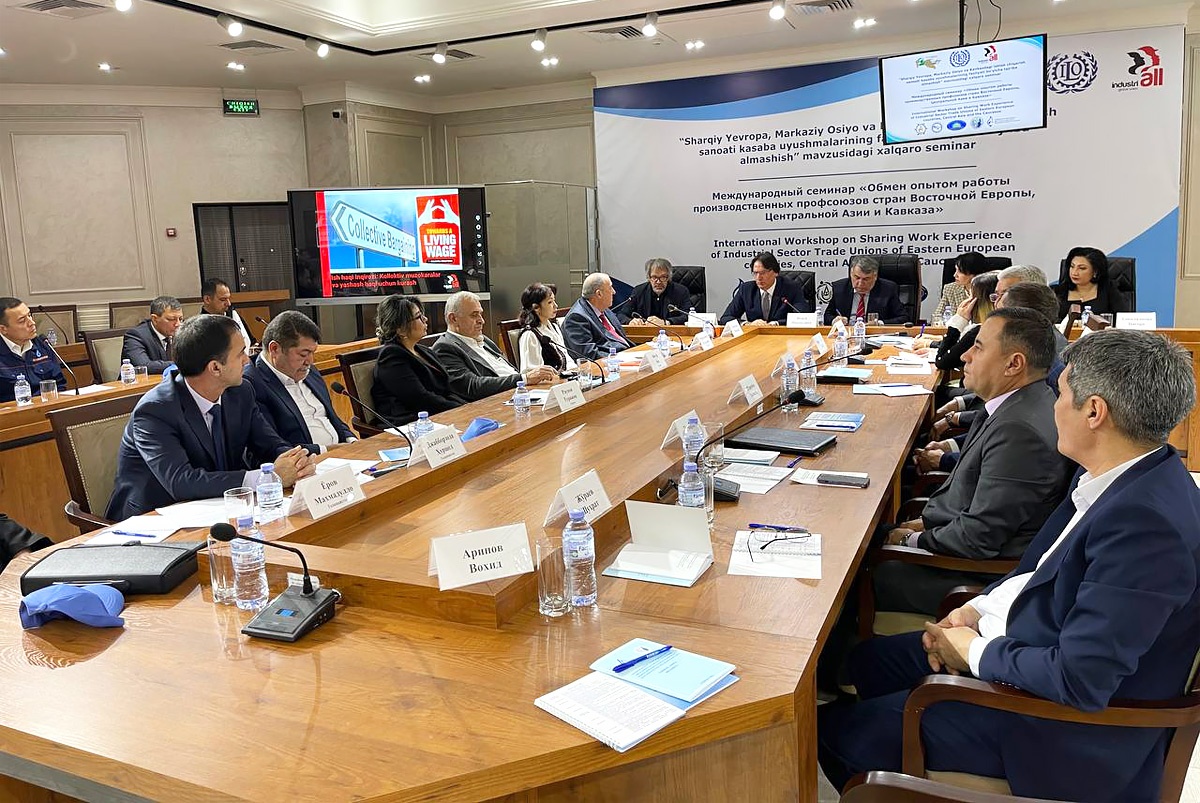Read this article in:
English
14 November, 2024On October 31, an international seminar held in Tashkent, Uzbekistan, aimed to promote cooperation by facilitating the exchange of experiences among industrial unions from Eastern Europe, Central Asia, and the Caucasus.
The event was organized in cooperation with the International Labor Organization (ILO), Workers’ Bureau (ACTRAV), the Federation of Trade Unions of Uzbekistan (FTUU) and IndustriALL Global Union, with the participation of Uzbek unions in the chemical, pharmaceutical, mining, automotiv, energy, oil, gas, textile and garment sectors. IndustriALL affiliates from Turkey, Kazakhstan and Tadjikistan joined the seminar to share experiences.
Yusuf Ziya Odabaş, vice-president of IndustriALL affiliate Turkish metalworkers’ union stressed the importance organizing campaigns given the challenges of freedom of association.
Recent years have seen a political transformation in Uzbekistan, marked by a commitment not only to democratic elections but also to fundamental human and labour rights. Changes to the labour legislation based on international labour standards, means that the current law guarantees union’ independence and rights. Uzbek unions report active involvement in the country's transformative processes based on the principles of social dialogue.
Uzbekistan is emerging as a player in global supply chains, particularly through its mining sector, where it stands as a major producer of gold, uranium, and critical minerals, alongside textile and garment exports for global brands. Uzbekistan’s exports gold, natural gas, cotton, textiles, and agricultural products, with gold alone accounting for approximately 30-35 per cent of total exports.
Since 2023, the minimum wage in Uzbekistan is 980,000 UZS (US$85), although the average wage is reported to be significantly higher at 3.5 million to 4.5 million UZS (US$300-340).
Discussions in the seminar centred around benefits in collective agreements, social and legal protection of trade union members and creation of favourable working conditions. According to participants, unions play an important role in regulating social and labour relations between employers and employees and do important work in protecting the individual and collective, social, labor and professional rights and interests of employees.
Nigora Alimdjanova, president of IndustriALL affiliate Trade Union of the chemical and pharmaceutical industry workers union thanked participants for sharing experiences, identifying problems and finding ways to solve them.
Otabek Temirov, vice-chairman of IndustriALL affiliate Navoi Mining Smelting Workers’ Union underlined the importance of international cooperation and solidarity as Uzbek unions move forward.
Before the seminar, IndustriALL joined a mission led by the International Trade Union Confederation (ITUC) to observe the recent developments in Uzbekistan through different meetings, including one with Prime Minister Abdulla Aripov.
Kudratilla Rafikov, president of the Federation of Trade Unions of Uzbekistan (FTUU) reported on the work of Uzbek trade unions, including ensuring employment and creating decent working conditions. Rafikov underlined that unions actively participate in the renewal and changes in the country, supporting reforms and protecting workers’ interests.
“IndustriALL continues to advocate for the recognition and effective enforcement of international labour rights and standards. We aim to strengthen our affiliates by providing information, education and training, as we recently did in Uzbekistan. We are committed to being a force of global solidarity, fighting for better working conditions and trade union rights around the world, including in Uzbekistan,”
said Kemal Özkan, IndustriALL assistant general secretary.








